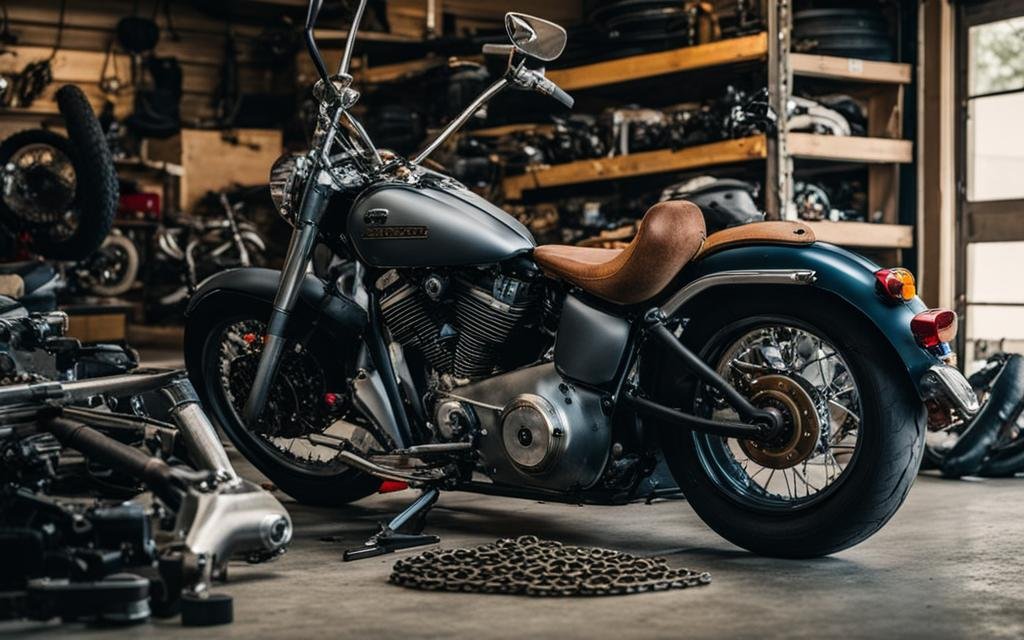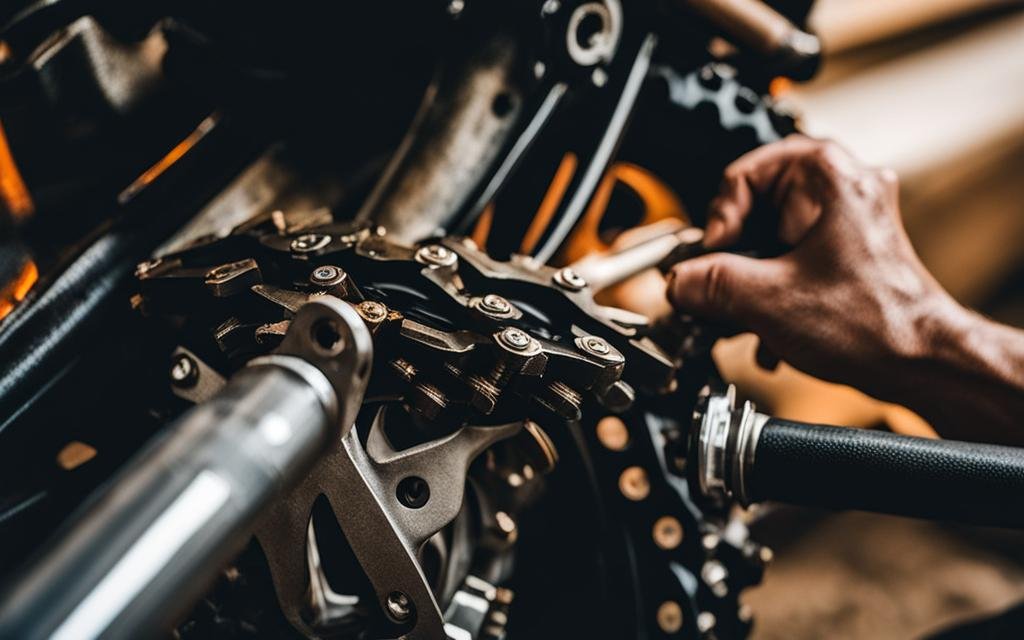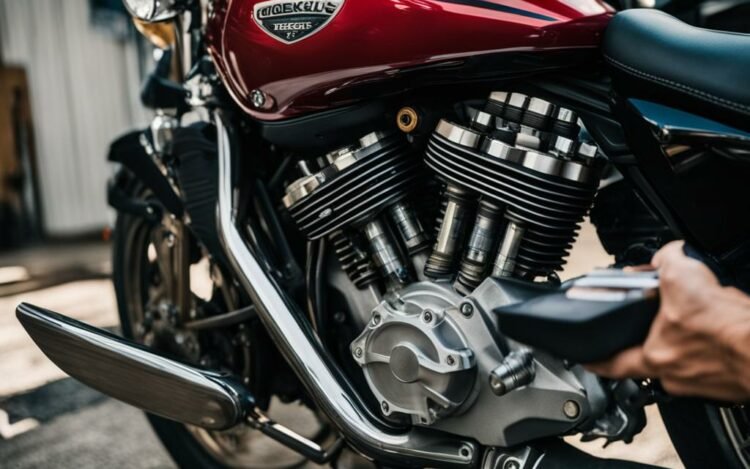Buying a used motorcycle can be an exciting and cost-effective way to own your dream bike. However, it can also be a daunting task if you don’t know what to look for. In this section, we will provide you with essential used motorcycle buying tips and a checklist to help you make an informed decision and avoid potential issues.
When you start your search for a used motorcycle, it’s important to have a checklist of factors to consider. This buying a used motorcycle checklist will help you determine whether the bike is worth buying and fits your needs.
The first thing to consider is the bike’s condition. Look for signs of wear and tear, corrosion, and damage to the frame, wheels, and body. Check if the bike has been in any accidents or has undergone major repairs.
The mileage is another crucial factor. High mileage can indicate a bike that has been heavily used and may have more wear and tear. However, low mileage doesn’t guarantee a perfect bike, as it could mean that the bike has been sitting unused for a long time.
Service history is also important as it gives you an idea of how well the bike has been maintained and any issues that have been addressed. Ask for service records and receipts for any work performed.
Last but not least, consider whether the bike has any modifications or aftermarket parts that could affect its performance or value.
By assessing these factors when buying a used motorcycle, you can make a more informed decision and avoid costly mistakes. Keep these tips in mind as you begin your search for the perfect ride!
Important Factors to Assess
When considering purchasing a used motorcycle, there are several things you need to assess to ensure you make the right choice. Below are the key factors to consider:
- Bike’s Condition: Inspect the motorcycle’s overall condition for any visible damages, scratches, or dents. Check for any rust, corrosion, or leaks too.
- Mileage: Evaluate the mileage as it indicates how much wear and tear the bike has undergone.
- Service History: Review the motorcycle’s service records to see how well it was maintained. A well-maintained bike has a longer lifespan and fewer issues.
- Modifications or Aftermarket Parts: Determine if the bike has any aftermarket parts or modifications as it can impact the motorcycle’s performance and value.
It is important to assess these factors as they can affect the bike’s safety, performance, and durability. Don’t hesitate to ask a seller for details or additional information on these factors.

Keep these important factors in mind when purchasing a used motorcycle. In the next section, we will delve into the essential pre-purchase inspections you need to conduct before making a decision.
Essential Pre-Purchase Inspections
Before finalizing your purchase, it is crucial to conduct thorough inspections on the used motorcycle. By doing so, you can avoid potential issues and ensure that you are making a well-informed decision. Here are some things to inspect before buying a used motorbike:
- Frame: Check for any signs of damage or cracks on the frame, as these can be expensive to repair and compromise the bike’s structural integrity.
- Engine: Start the engine and listen for any odd sounds or vibrations. Check for leaks around the engine and transmission.
- Brakes: Test the brakes to ensure they are functioning correctly. Look for any signs of wear on the brake pads and discs.
- Tires: Inspect the tires for any signs of wear or damage. Check the tread depth and ensure that it meets legal requirements.
- Electrical components: Test the lights, turn signals, and horn to ensure they are all working correctly. Check the battery’s condition and look for any wiring issues or loose connections.
By inspecting these essential areas, you can detect any potential red flags or hidden issues that may not be immediately obvious. If you are not confident in conducting these inspections yourself, consider hiring a professional mechanic to do it for you. It may cost you a little extra, but it can save you a lot of time, money, and headache in the long run.

Evaluating the Seller
Assessing the credibility of the seller is an essential step when buying a pre-owned motorcycle. You want to ensure that you are dealing with a reliable and trustworthy seller who is not trying to scam you. Here are some tips for evaluating the seller:
- Check their reputation: Do some research on the seller before meeting them in person. Look for reviews or ratings on online marketplaces or forums. See if other buyers have had positive experiences with them.
- Verify ownership documentation: Ask the seller to provide you with the bike’s title and registration papers. Verify that the documents match the seller’s name and address. If possible, check the VIN number on the documents against the one on the bike to ensure they match.
- Conduct a test ride: Before finalizing the purchase, take the motorcycle for a test ride. This will give you a chance to see how it handles and if there are any issues that the seller may have neglected to disclose.
By evaluating the seller, you can minimize the risk of buying a stolen or malfunctioning motorcycle. Trust your instincts and if something doesn’t feel right, walk away from the deal.
Price Research and Negotiation
When buying a used bike, it is crucial to understand the market value of the bike you are interested in. Conduct thorough price research on the make and model, taking into account factors such as age, mileage, condition, and any modifications or upgrades. This research will help you negotiate a fair price and avoid overspending.
Keep in mind that the price of a used motorcycle is often negotiable. Don’t be afraid to haggle with the seller, but do so respectfully and with evidence to support your proposed price.
Be aware that the seller may have emotional attachments to the bike, which can make the negotiation process more challenging. However, by remaining calm and rational, you can reach a mutually beneficial agreement.
Avoid rushing the negotiation process and take the time to carefully consider your options. Remember to factor in any additional costs, such as registration fees, insurance, and maintenance expenses.
Ultimately, the goal of price research and negotiation is to secure a good deal on a high-quality used motorcycle. By following the tips outlined in this section and the ones before, you can confidently make an informed decision and find the perfect ride for your needs and budget.
Conclusion
Buying a used motorcycle can be an exciting and rewarding experience, but it requires careful consideration and attention to detail. Remember to always assess the bike’s condition, mileage, service history, and any modifications before finalizing your purchase. Conduct thorough inspections on the frame, engine, brakes, tires, and electrical components to identify any potential issues.
It is also important to evaluate the credibility of the seller by checking their reputation, verifying ownership documentation, and conducting a test ride. Understanding the market value of the specific make and model you are interested in is crucial for negotiating a fair price. Conduct price research and use negotiation strategies to ensure a good deal without overspending.
By following the guidelines outlined in this article, you can confidently navigate the used motorcycle market, make informed decisions, and find a reliable and enjoyable ride. Remember to trust your instincts and always prioritize safety. Happy riding!
FAQ
What should I look for when buying a used motorcycle?
When buying a used motorcycle, you should consider factors such as the bike’s condition, mileage, service history, and any modifications or aftermarket parts.
What are the important factors to assess when purchasing a used motorcycle?
Some important factors to assess when purchasing a used motorcycle include its condition, mileage, service history, and any modifications or aftermarket parts.
What inspections should I conduct before buying a used motorbike?
Before finalizing your purchase, it is essential to inspect the frame, engine, brakes, tires, and electrical components of the used motorcycle to identify any potential issues.
How do I evaluate the seller when buying a used motorcycle?
To evaluate the seller, you should check their reputation, verify ownership documentation, and conduct a test ride to ensure a reliable and trustworthy transaction.
How can I research the price and negotiate when buying a used motorcycle?
Conducting price research on the specific make and model you are interested in is crucial for negotiating a fair price. This section will provide tips on conducting price research and negotiation strategies.

